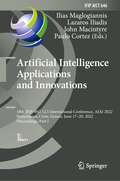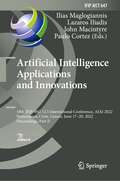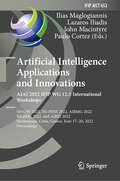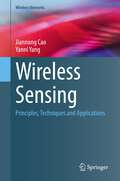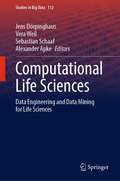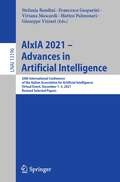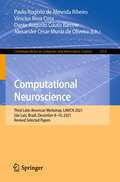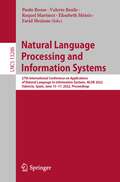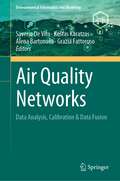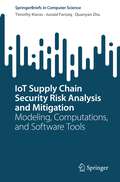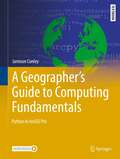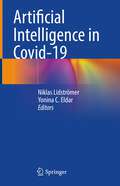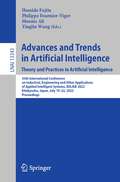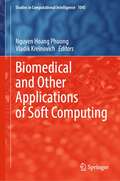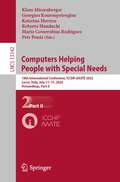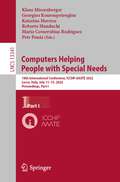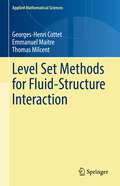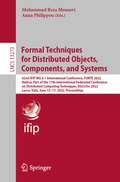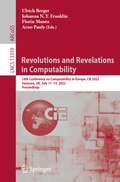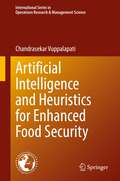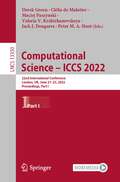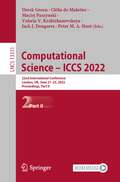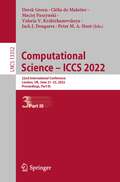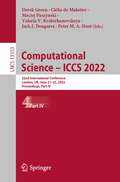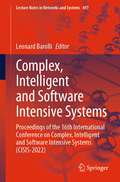- Table View
- List View
Artificial Intelligence Applications and Innovations: 18th IFIP WG 12.5 International Conference, AIAI 2022, Hersonissos, Crete, Greece, June 17–20, 2022, Proceedings, Part I (IFIP Advances in Information and Communication Technology #646)
by Ilias Maglogiannis Lazaros Iliadis John Macintyre Paulo CortezThis book constitutes the refereed proceedings of five International Workshops held as parallel events of the 18th IFIP WG 12.5 International Conference on Artificial Intelligence Applications and Innovations, AIAI 2022, virtually and in Hersonissos, Crete, Greece, in June 2022: the 11th Mining Humanistic Data Workshop (MHDW 2022); the 7th 5G-Putting Intelligence to the Network Edge Workshop (5G-PINE 2022); the 1st workshop on AI in Energy, Building and Micro-Grids (AIBMG 2022); the 1st Workshop/Special Session on Machine Learning and Big Data in Health Care (ML@HC 2022); and the 2nd Workshop on Artificial Intelligence in Biomedical Engineering and Informatics (AIBEI 2022). The 35 full papers presented at these workshops were carefully reviewed and selected from 74 submissions.
Artificial Intelligence Applications and Innovations: 18th IFIP WG 12.5 International Conference, AIAI 2022, Hersonissos, Crete, Greece, June 17–20, 2022, Proceedings, Part II (IFIP Advances in Information and Communication Technology #647)
by Ilias Maglogiannis Lazaros Iliadis John Macintyre Paulo CortezThis book constitutes the refereed proceedings of five International Workshops held as parallel events of the 18th IFIP WG 12.5 International Conference on Artificial Intelligence Applications and Innovations, AIAI 2022, virtually and in Hersonissos, Crete, Greece, in June 2022: the 11th Mining Humanistic Data Workshop (MHDW 2022); the 7th 5G-Putting Intelligence to the Network Edge Workshop (5G-PINE 2022); the 1st workshop on AI in Energy, Building and Micro-Grids (AIBMG 2022); the 1st Workshop/Special Session on Machine Learning and Big Data in Health Care (ML@HC 2022); and the 2nd Workshop on Artificial Intelligence in Biomedical Engineering and Informatics (AIBEI 2022). The 35 full papers presented at these workshops were carefully reviewed and selected from 74 submissions.
Artificial Intelligence Applications and Innovations. AIAI 2022 IFIP WG 12.5 International Workshops: MHDW 2022, 5G-PINE 2022, AIBMG 2022, ML@HC 2022, and AIBEI 2022, Hersonissos, Crete, Greece, June 17–20, 2022, Proceedings (IFIP Advances in Information and Communication Technology #652)
by Ilias Maglogiannis Lazaros Iliadis John Macintyre Paulo CortezThis book constitutes the refereed proceedings of five International Workshops held as parallel events of the 18th IFIP WG 12.5 International Conference on Artificial Intelligence Applications and Innovations, AIAI 2022, virtually and in Hersonissos, Crete, Greece, in June 2022: the 11th Mining Humanistic Data Workshop (MHDW 2022); the 7th 5G-Putting Intelligence to the Network Edge Workshop (5G-PINE 2022); the 1st workshop on AI in Energy, Building and Micro-Grids (AIBMG 2022); the 1st Workshop/Special Session on Machine Learning and Big Data in Health Care (ML@HC 2022); and the 2nd Workshop on Artificial Intelligence in Biomedical Engineering and Informatics (AIBEI 2022). The 35 full papers presented at these workshops were carefully reviewed and selected from 74 submissions.
Wireless Sensing: Principles, Techniques and Applications (Wireless Networks)
by Jiannong Cao Yanni YangThis book systematically presents the wireless sensing technology, which has become a promising sensing paradigm in recent years. It includes the introduction of underlying sensing principles, wireless signals, sensing methodologies and enabled applications. Meanwhile, it provides case studies to demonstrate how wireless sensing is applied for representative human and object sensing applications.This book also provides a wireless sensing framework as a guidance to understand and design a wireless sensing system or prototype based on their needs. It also presents a critical investigation of the challenges in achieving wireless sensing in both signal-level and application-level contexts. Accordingly, it summarizes the typical solutions to tackle the related challenges.Researchers and advanced-level students in computer science or electrical engineering working on the design of a wireless system will find this book useful as a reference. Professionals working in the wireless sensing industry will also find this book valuable as a reference tool.
Computational Life Sciences: Data Engineering and Data Mining for Life Sciences (Studies in Big Data #112)
by Jens Dörpinghaus Vera Weil Sebastian Schaaf Alexander ApkeThis book broadly covers the given spectrum of disciplines in Computational Life Sciences, transforming it into a strong helping hand for teachers, students, practitioners and researchers. In Life Sciences, problem-solving and data analysis often depend on biological expertise combined with technical skills in order to generate, manage and efficiently analyse big data. These technical skills can easily be enhanced by good theoretical foundations, developed from well-chosen practical examples and inspiring new strategies. This is the innovative approach of Computational Life Sciences-Data Engineering and Data Mining for Life Sciences: We present basic concepts, advanced topics and emerging technologies, introduce algorithm design and programming principles, address data mining and knowledge discovery as well as applications arising from real projects. Chapters are largely independent and often flanked by illustrative examples and practical advise.
AIxIA 2021 – Advances in Artificial Intelligence: 20th International Conference of the Italian Association for Artificial Intelligence, Virtual Event, December 1–3, 2021, Revised Selected Papers (Lecture Notes in Computer Science #13196)
by Stefania Bandini Francesca Gasparini Viviana Mascardi Matteo Palmonari Giuseppe VizzariThis book constitutes revised selected papers from the refereed proceedings of the 20th International Conference of the Italian Association for Artificial Intelligence, AIxIA 2021, which was held virtually in December 2021.The 36 full papers included in this book were carefully reviewed and selected from 58 submissions; the volume also contains 12 extended and revised workshop contributions. The papers were organized in topical sections as follows: Planning and strategies; constraints, argumentation, and logic programming; knowledge representation, reasoning, and learning; natural language processing; AI for content and social media analysis; signal processing: images, videos and speech; machine learning for argumentation, explanation, and exploration; machine learning and applications; and AI applications.
Computational Neuroscience: Third Latin American Workshop, LAWCN 2021, São Luís, Brazil, December 8–10, 2021, Revised Selected Papers (Communications in Computer and Information Science #1519)
by Paulo Rogério de Almeida Ribeiro Vinícius Rosa Cota Dante Augusto Couto Barone Alexandre César Muniz de OliveiraThis book constitutes the refereed proceedings of the Third Latin American Workshop, LAWCN 2021, held in Sao Luis do Maranhao, Brazil, during December 8–10, 2021.The 13 full papers and 3 short papers included in this book were carefully reviewed and selected from 27 submissions. They were organized in topical sections as follows: Interdisciplinary applications of Artificial Intelligence (AI) and Machine Learning (ML); AI and ML applied to robotics; AI and ML applied to biomedical sciences; Health issues and computational neuroscience; Software and hardware implementations in neuroscience; and Neuroengineering – science and technology.
Natural Language Processing and Information Systems: 27th International Conference on Applications of Natural Language to Information Systems, NLDB 2022, Valencia, Spain, June 15–17, 2022, Proceedings (Lecture Notes in Computer Science #13286)
by Paolo Rosso Valerio Basile Raquel Martínez Elisabeth Métais Farid MezianeThis book constitutes the refereed proceedings of the 27th International Conference on Applications of Natural Language to Information Systems, NLDB 2022, held in Valencia, Spain in June 2022. The 28 full papers and 20 short papers were carefully reviewed and selected from 106 submissions. The papers are organized in the following topical sections: Sentiment Analysis and Social Media; Text Classification; Applications; Argumentation; Information Extraction and Linking; User Profiling; Semantics; Language Resources and Evaluation.
Air Quality Networks: Data Analysis, Calibration & Data Fusion (Environmental Informatics and Modeling)
by Saverio De Vito Kostas Karatzas Alena Bartonova Grazia FattorusoThis volume offers expert contributions proposing new and recently set scientific standards for smart air quality (AQ) networks data processing, along with results obtained during field deployments of pervasive and mobile systems. The book is divided into 5 main sections; 1) future air quality networks, 2) general data processing techniques, 3) field deployments performances, 4) special applications, and 5) cooperative and regulatory efforts. The authors offer different sources of data for the production of trustworthy insights, including spatio-temporal predictive AQ maps meant to boost citizen awareness, and informed participation in remediation and prevention policies. Readers will learn about the best and most up-to-date practices for measuring and assessing air quality, while also learning about current regulatory statuses regarding air quality technology design and implementation. The book will be of interest to air quality regulatory agencies, citizen science groups, city authorities, and researchers and students working with air quality sensors and geostatistics.
IoT Supply Chain Security Risk Analysis and Mitigation: Modeling, Computations, and Software Tools (SpringerBriefs in Computer Science)
by Timothy Kieras Junaid Farooq Quanyan ZhuThis SpringerBrief introduces methodologies and tools for quantitative understanding and assessment of supply chain risk to critical infrastructure systems. It unites system reliability analysis, optimization theory, detection theory and mechanism design theory to study vendor involvement in overall system security. It also provides decision support for risk mitigation.This SpringerBrief introduces I-SCRAM, a software tool to assess the risk. It enables critical infrastructure operators to make risk-informed decisions relating to the supply chain, while deploying their IT/OT and IoT systems.The authors present examples and case studies on supply chain risk assessment/mitigation of modern connected infrastructure systems such as autonomous vehicles, industrial control systems, autonomous truck platooning and more. It also discusses how vendors of different system components are involved in the overall security posture of the system and how the risk can be mitigated through vendor selection and diversification. The specific topics in this book include: Risk modeling and analysis of IoT supply chains Methodologies for risk mitigation, policy management, accountability, and cyber insurance Tutorial on a software tool for supply chain risk management of IoT These topics are supported by up-to-date summaries of the authors’ recent research findings. The authors introduce a taxonomy of supply chain security and discusses the future challenges and directions in securing the supply chains of IoT systems. It also focuses on the need for joint policy and technical solutions to counter the emerging risks, where technology should inform policy and policy should regulate technology development.This SpringerBrief has self-contained chapters, facilitating the readers to peruse individual topics of interest. It provides a broad understanding of the emerging field of cyber supply chain security in the context of IoT systems to academics, industry professionals and government officials.
A Geographer's Guide to Computing Fundamentals: Python in ArcGIS Pro (Springer Textbooks in Earth Sciences, Geography and Environment)
by Jamison ConleyThis upper-undergraduate textbook teaches students programming in GIS using a mix of computer science theory and hands-on activities, with the aim of empowering students to understand fundamentals and apply their knowledge beyond the specific examples in the book. Each of the book’s twenty-one chapters integrates instructional material with exercises in ArcGIS Pro. In doing so, this book combines the strengths of workbooks and theoretical textbooks to provide a holistic and comprehensive text. Each chapter concludes with an unguided task that ensures students have learned the broader principles explained therein. In addition to its unique format, the book covers oft-neglected topics such as debugging, creating a program from scratch, and managing metadata. Section I starts with the principles of scripting and programming with Python. Section II introduces the ArcPy module and elements specific to ArcGIS Pro. This section focuses on data structures, and how they are used and implemented within Python. Section III uses the topic of algorithms to guide the student through creating tools to add functionality to ArcGIS Pro. The last section, Section IV, builds upon section III to guide the student to developing and sharing projects and Python packages to include external open-source code and share the Python code as an open-source package. This text will prepare students for a long-term ability to do GIS programming, whether in industry or academic research. This comes from the author’s observations of students who have learned GIS programming in one platform, such as VBA in ArcMap, struggle to apply that knowledge to a new platform, such as Python in ArcGIS Pro, because the content was presented too closely with a specific platform. The integration of exercises with conceptual content, along with the choice of chapter content, serves this goal of preparing students for working in a dynamic, rapidly changing technology field.
Artificial Intelligence in Covid-19
by Yonina C. Eldar Niklas LidströmerThis book deals with the advantages of using artificial intelligence (AI) in the fight against the COVID-19 and against future pandemics that could threat humanity and our environment. This book is a practical, scientific and clinically relevant example of how medicine and mathematics will fuse in the 2020s, out of external pandemic pressure and out of scientific evolutionary necessity. This book contains a unique blend of the world's leading researchers, both in medicine, mathematics, computer science, clinical and preclinical medicine, and presents the research front of the usage of AI against pandemics. Equipped with this book the reader will learn about the latest AI advances against COVID-19, and how mathematics and algorithms can aid in preventing its spreading course, treatments, diagnostics, vaccines, clinical management and future evolution.
Advances and Trends in Artificial Intelligence. Theory and Practices in Artificial Intelligence: 35th International Conference on Industrial, Engineering and Other Applications of Applied Intelligent Systems, IEA/AIE 2022, Kitakyushu, Japan, July 19–22, 2022, Proceedings (Lecture Notes in Computer Science #13343)
by Hamido Fujita Philippe Fournier-Viger Moonis Ali Yinglin WangThis book constitutes the thoroughly refereed proceedings of the 35th International Conference on Industrial, Engineering and Other Applications of Applied Intelligent Systems, IEA/AIE 2022, held in Kitakyushu, Japan, in July 2022. The 67 full papers and 11 short papers presented were carefully reviewed and selected from 127 submissions. The IEA/AIE 2022 conference focuses on focuses on applications of applied intelligent systems to solve real-life problems in all areas including business and finance, science, engineering, industry, cyberspace, bioinformatics, automation, robotics, medicine and biomedicine, and human-machine interactions.
Biomedical and Other Applications of Soft Computing (Studies in Computational Intelligence #1045)
by Nguyen Hoang Phuong Vladik KreinovichThis book describes current and potential use of artificial intelligence and computational intelligence techniques in biomedicine and other application areas. Medical applications range from general diagnostics to processing of X-ray images to e-medicine-related privacy issues. Medical community understandably prefers methods that have been successful other on other application areas, where possible mistakes are not that critical. This book describes many promising methods related to deep learning, fuzzy techniques, knowledge graphs, and quantum computing. It also describes the results of testing these new methods in communication networks, education, environmental studies, food industry, retail industry, transportation engineering, and many other areas. This book helps practitioners and researchers to learn more about computational intelligence methods and their biomedical applications—and to further develop this important research direction.
Computers Helping People with Special Needs: 18th International Conference, ICCHP-AAATE 2022, Lecco, Italy, July 11–15, 2022, Proceedings, Part II (Lecture Notes in Computer Science #13342)
by Roberto Manduchi Klaus Miesenberger Mario Covarrubias Rodriguez Georgios Kouroupetroglou Katerina Mavrou Petr PenázThe two-volume set LNCS 13341 and 13342 constitutes the refereed proceedings of the Joint International Conference on Digital Inclusion, Assistive Technology, and Accessibility, ICCHP-AAATE 2022. The conference was held in Lecco, Italy, in July 2022. The 112 papers presented were carefully reviewed and selected from 285 submissions. Included also are 18 introductions. The papers are organized in the following topical sections: Part I: Art Karshmer Lectures in Access to Mathematics, Science and Engineering; Digital Solutions for Inclusive Mobility: solutions and accessible maps for indoor and outdoor mobility; implementation and innovation in the area of independent mobility through digital technologies; haptic and digital access to art and artefacts; accessibility of co-located meetings; interactions for text input and alternative pointing; cognitive disabilities and accessibility; augmentative and alternative communication (AAC): emerging trends, opportunities and innovations; language accessibility for the deaf and hard-of-hearing. Part II: Digital accessibility: readability and understandability; serious and fun games; internet of things: services and applications for people with disabilities and elderly persons; technologies for inclusion and participation at work and everyday activities; robotic and virtual reality technologies for children with disabilities and older adults; development, evaluation and assessment of assistive technologies; ICT to support inclusive education – universal learning design (ULD); design for assistive technologies and rehabilitation; assistive technologies and inclusion for older people.
Computers Helping People with Special Needs: 18th International Conference, ICCHP-AAATE 2022, Lecco, Italy, July 11–15, 2022, Proceedings, Part I (Lecture Notes in Computer Science #13341)
by Klaus Miesenberger Georgios Kouroupetroglou Katerina Mavrou Roberto Manduchi Mario Covarrubias Rodriguez Petr PenázThe two-volume set LNCS 13341 and 13342 constitutes the refereed proceedings of the Joint International Conference on Digital Inclusion, Assistive Technology, and Accessibility, ICCHP-AAATE 2022. The conference was held in Lecco, Italy, in July 2022.The 112 papers presented were carefully reviewed and selected from 285 submissions. Included also are 18 introductions. The papers are organized in the following topical sections: Part I: Art Karshmer Lectures in Access to Mathematics, Science and Engineering; Digital Solutions for Inclusive Mobility: solutions and accessible maps for indoor and outdoor mobility; implementation and innovation in the area of independent mobility through digital technologies; haptic and digital access to art and artefacts; accessibility of co-located meetings; interactions for text input and alternative pointing; cognitive disabilities and accessibility; augmentative and alternative communication (AAC): emerging trends, opportunities and innovations; language accessibility for the deaf and hard-of-hearing. Part II: Digital accessibility: readability and understandability; serious and fun games; internet of things: services and applications for people with disabilities and elderly persons; technologies for inclusion and participation at work and everyday activities; robotic and virtual reality technologies for children with disabilities and older adults; development, evaluation and assessment of assistive technologies; ICT to support inclusive education – universal learning design (ULD); design for assistive technologies and rehabilitation; assistive technologies and inclusion for older people.
Level Set Methods for Fluid-Structure Interaction (Applied Mathematical Sciences #210)
by Georges-Henri Cottet Emmanuel Maitre Thomas MilcentThis monograph is devoted to Eulerian models for fluid-structure interaction by applying the original point of view of level set methods.In the last 15 years, Eulerian models have become popular tools for studying fluid-structure interaction problems. One major advantage compared to more conventional methods such as ALE methods is that they allow the use of a single grid and a single discretization method for the different media. Level set methods in addition provide a general framework to follow the fluid-solid interfaces, to represent the elastic stresses of solids, and to model the contact forces between solids.This book offers a combination of mathematical modeling, aspects of numerical analysis, elementary codes and numerical illustrations, providing the reader with insights into the applications and performance of these models.Assuming background at the level of a Master’s degree, Level Set Methods for Fluid-Structure Interaction provides researchers in the fields of numerical analysis of PDEs, theoretical and computational mechanics with a basic reference on the topic. Its pedagogical style and organization make it particularly suitable for graduate students and young researchers.
Formal Techniques for Distributed Objects, Components, and Systems: 42nd IFIP WG 6.1 International Conference, FORTE 2022, Held as Part of the 17th International Federated Conference on Distributed Computing Techniques, DisCoTec 2022, Lucca, Italy, June 13–17, 2022, Proceedings (Lecture Notes in Computer Science #13273)
by Mohammad Reza Mousavi Anna PhilippouThis book constitutes the refereed proceedings of the 42nd IFIP WG 6.1 International Conference on Formal Techniques for Distributed Objects, Components, and Systems, FORTE 2022, held in Lucca, Italy, in June 2022, as part of the 17th International Federated Conference on Distributed Computing Techniques, DisCoTec 2022.The 12 regular papers presented were carefully reviewed and selected from 28 submissions. They cover topics such as: software quality, reliability, availability, and safety; security, privacy, and trust in distributed and/or communicating systems; service-oriented, ubiquitous, and cloud computing systems; component-and model-based design; object technology, modularity, and software adaptation; self-stabilisation and self-healing/organising; and verification, validation, formal analysis, and testing of the above.
Revolutions and Revelations in Computability: 18th Conference on Computability in Europe, CiE 2022, Swansea, UK, July 11–15, 2022, Proceedings (Lecture Notes in Computer Science #13359)
by Florin Manea Arno Pauly Ulrich Berger Johanna N. Y. FranklinThis book constitutes the proceedings of the 18th Conference on Computability in Europe, CiE 2022, in Swansea, UK, in July 2022. The 19 full papers together with 7 invited papers presented in this volume were carefully reviewed and selected from 41 submissions. The motto of CiE 2022 was “Revolutions and revelations in computability”. This alludes to the revolutionary developments we have seen in computability theory, starting with Turing's and Gödel's discoveries of the uncomputable and the unprovable and continuing to the present day with the advent of new computational paradigms such as quantum computing and bio-computing, which have dramatically changed our view of computability and revealed new insights into the multifarious nature of computation.
Artificial Intelligence and Heuristics for Enhanced Food Security (International Series in Operations Research & Management Science #331)
by Chandrasekar VuppalapatiThis book introduces readers to advanced data science techniques for signal mining in connection with agriculture. It shows how to apply heuristic modeling to improve farm-level efficiency, and how to use sensors and data intelligence to provide closed-loop feedback, while also providing recommendation techniques that yield actionable insights. The book also proposes certain macroeconomic pricing models, which data-mine macroeconomic signals and the influence of global economic trends on small-farm sustainability to provide actionable insights to farmers, helping them avoid financial disasters due to recurrent economic crises. The book is intended to equip current and future software engineering teams and operations research experts with the skills and tools they need in order to fully utilize advanced data science, artificial intelligence, heuristics, and economic models to develop software capabilities that help to achieve sustained food security for future generations.
Computational Science – ICCS 2022: 22nd International Conference, London, UK, June 21–23, 2022, Proceedings, Part I (Lecture Notes in Computer Science #13350)
by Derek Groen Clélia De Mulatier Maciej Paszynski Valeria V. Krzhizhanovskaya Jack J. Dongarra Peter M. A. SlootThe four-volume set LNCS 13350, 13351, 13352, and 13353 constitutes the proceedings of the 22ndt International Conference on Computational Science, ICCS 2022, held in London, UK, in June 2022.* The total of 175 full papers and 78 short papers presented in this book set were carefully reviewed and selected from 474 submissions. 169 full and 36 short papers were accepted to the main track; 120 full and 42 short papers were accepted to the workshops/ thematic tracks. *The conference was held in a hybrid format
Computational Science – ICCS 2022: 22nd International Conference, London, UK, June 21–23, 2022, Proceedings, Part II (Lecture Notes in Computer Science #13351)
by Derek Groen Clélia De Mulatier Maciej Paszynski Valeria V. Krzhizhanovskaya Jack J. Dongarra Peter M. A. SlootThe four-volume set LNCS 13350, 13351, 13352, and 13353 constitutes the proceedings of the 22ndt International Conference on Computational Science, ICCS 2022, held in London, UK, in June 2022.* The total of 175 full papers and 78 short papers presented in this book set were carefully reviewed and selected from 474 submissions. 169 full and 36 short papers were accepted to the main track; 120 full and 42 short papers were accepted to the workshops/ thematic tracks. *The conference was held in a hybrid format
Computational Science – ICCS 2022: 22nd International Conference, London, UK, June 21–23, 2022, Proceedings, Part III (Lecture Notes in Computer Science #13352)
by Valeria V. Krzhizhanovskaya Jack J. Dongarra Peter M. A. Sloot Maciej Paszynski Derek Groen Clélia De MulatierThe four-volume set LNCS 13350, 13351, 13352, and 13353 constitutes the proceedings of the 22ndt International Conference on Computational Science, ICCS 2022, held in London, UK, in June 2022.* The total of 175 full papers and 78 short papers presented in this book set were carefully reviewed and selected from 474 submissions. 169 full and 36 short papers were accepted to the main track; 120 full and 42 short papers were accepted to the workshops/ thematic tracks. *The conference was held in a hybrid format
Computational Science – ICCS 2022: 22nd International Conference, London, UK, June 21–23, 2022, Proceedings, Part IV (Lecture Notes in Computer Science #13353)
by Derek Groen Clélia De Mulatier Maciej Paszynski Valeria V. Krzhizhanovskaya Jack J. Dongarra Peter M. A. SlootThe four-volume set LNCS 13350, 13351, 13352, and 13353 constitutes the proceedings of the 22ndt International Conference on Computational Science, ICCS 2022, held in London, UK, in June 2022.* The total of 175 full papers and 78 short papers presented in this book set were carefully reviewed and selected from 474 submissions. 169 full and 36 short papers were accepted to the main track; 120 full and 42 short papers were accepted to the workshops/ thematic tracks. *The conference was held in a hybrid format
Complex, Intelligent and Software Intensive Systems: Proceedings of the 16th International Conference on Complex, Intelligent and Software Intensive Systems (CISIS-2022) (Lecture Notes in Networks and Systems #497)
by Leonard BarolliSoftware intensive systems are systems, which heavily interact with other systems, sensors, actuators, devices, other software systems, and users. More and more domains are involved with software intensive systems, e.g., automotive, telecommunication systems, embedded systems in general, industrial automation systems, and business applications. Moreover, the outcome of web services delivers a new platform for enabling software intensive systems. Complex systems research is focused on the overall understanding of systems rather than its components. Complex systems are very much characterized by the changing environments in which they act by their multiple internal and external interactions. They evolve and adapt through internal and external dynamic interactions. The development of intelligent systems and agents, which is each time more characterized by the use of ontologies and their logical foundations, builds a fruitful impulse for both software intensive systems and complex systems. Recent research in the field of intelligent systems, robotics, neuroscience, artificial intelligence, and cognitive sciences is a very important factor for the future development and innovation of software intensive and complex systems. The aim of the book “Complex, Intelligent and Software Intensive Systems” is to deliver a platform of scientific interaction between the three interwoven challenging areas of research and development of future ICT-enabled applications: software intensive systems, complex systems, and intelligent systems.
